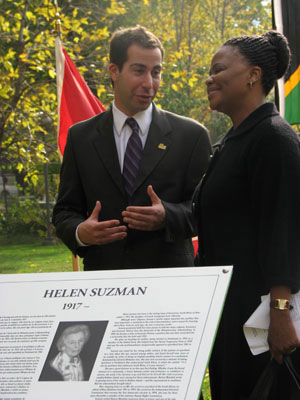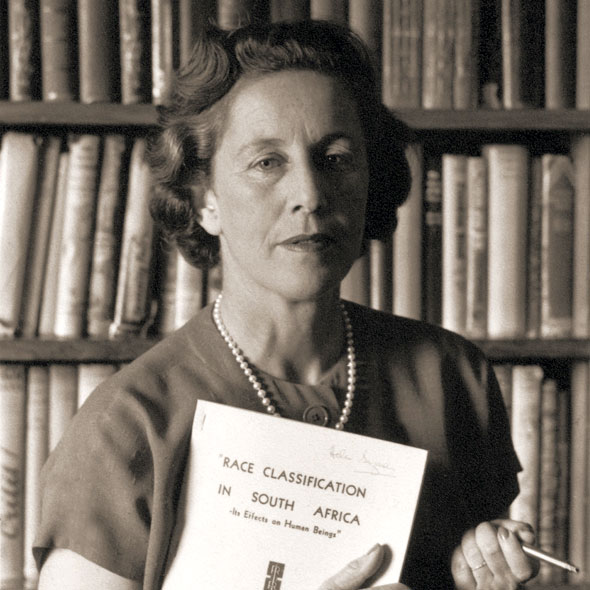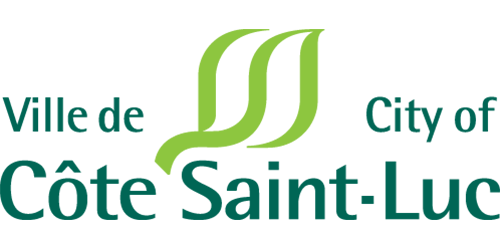
Côte Saint-Luc a ajouté le nom d’Helen Suzman à la Promenade des droits de la personne, située au parc Pierre Elliott Trudeau, lors d’une cérémonie qui s’est déroulée en mi-journée le 19 octobre dernier.
Mme Suzman était une activiste anti-apartheid et une politicienne d’Afrique du Sud reconnue pour ses critiques publiques sévères à l’endroit des politiques d’apartheid, à une époque où cette attitude était peu courante de la part des blancs. Née en 1917, elle a servi au Parlement d’Afrique du Sud pendant 36 ans et a été une critique très vocale de la politique de l’apartheid. À un ministre qui l’avait accusée de poser des questions embarrassantes pour l’Afrique du Sud, elle répondit : « Ce ne sont pas mes questions qui embarrassent l’Afrique du Sud, ce sont vos réponses ».
Après l’apartheid, lors de la tenue des premières élections libres, Mme Suzman était aux côtés du Président Nelson Mandela en 1996 lorsqu’il a signé la nouvelle constitution. Maintenant âgée de 91 ans, elle habite l’Afrique du Sud.
Le maire Anthony Housefather a lu une allocution, accompagné de Lawrence Bergman, député de D’Arcy McGee, et de la consule générale d’Afrique du Sud, Nogolide F. Nojozi, qui ont aussi pris la parole.
La Promenade des droits de la personne a été inaugurée en 2000; elle est dédiée aux femmes et aux hommes qui, par leur engagement inébranlable au service de l’humanité, ont tenu bien haut la flamme des droits humains pour que sa lumière se répande sur le monde. Sept personnes ont déjà été honorées sur la promenade. Helen Suzman est la première représentante du continent africain à y être honorée.
Informations : Promenade des droits de la personne
www.hsf.org.za
Helen Suzman (1917 – 2009)

Helen Suzman, fille d’immigrants juifs de Lituanie, est née dans la ville minière de Germiston, en Afrique du Sud, le 7 novembre 1917.
Bien que ne pratiquant pas la religion, elle tient de ses origines juives deux qualités importantes : une grande sensibilité aux méfaits de la discrimination et un respect pour l’apprentissage et la culture. Dès son jeune âge, elle est passionnée de lecture.
Helen Suzman est diplômée de l’Université de Witwatersrand, à Johannesburg, qui lui a décerné une mention honorable dans ses deux principaux sujets d’études, économique et histoire économique. En 1945, elle devient tutrice en histoire économique, fonction qui évoluera plus tard vers un poste de professeur qu’elle occupera jusqu’en 1952.
En 1953, elle quitte l’enseignement pour se consacrer à la politique et elle est élue au Parlement sous les couleurs du Parti uni. En 1959, elle participe à la formation du Parti progressiste et sera la seule voix anti-apartheid au Parlement de 1961 à 1974.
Helen Suzman était reconnue pour ses critiques publiques très sévères à l’endroit des politiques de l’apartheid, à une époque où une telle attitude était rare de la part des blancs, et elle s’est retrouvée encore plus isolée étant une femme juive anglophone dans un parlement dominé par des hommes afrikaners calvinistes. À un ministre qui l’avait accusée de poser des questions embarrassantes pour l’Afrique du Sud, elle répondit : « Ce ne sont pas mes questions qui embarrassent l’Afrique du Sud, ce sont vos réponses ».
Elle tenait toujours résolument à vérifier les faits sur place. Qu’il s’agisse de l’élimination forcée d’une communauté, d’une altercation entre policiers et manifestants, ou encore des conditions de vie en prison, elle se faisait un devoir d’aller constater les faits par elle-même. Ses visites aux prisons, notamment à Robben Island, furent parmi ses plus belles réalisations. Nelson Mandela a relaté en termes très élogieux ses visites à Robben Island, en soulignant l’amélioration des conditions due à son intervention.
Après avoir quitté son poste de députée, elle a siégé comme présidente de l’Institut des relations raciales d’Afrique du Sud de 1991 à 1993. Elle a siégé aussi à la Commission électorale indépendante qui a encadré la première élection démocratique en 1994, et elle a ensuite été pendant trois ans membre de la Commission des droits de l’homme prévue par la loi.
Helen Suzman rendit souvent visite à Nelson Mandela en prison, et elle était à ses côtés en 1996 lorsqu’il a signé la nouvelle constitution de l’Afrique du Sud en tant que président. Après sa retraite de la politique, elle a créé la Fondation Helen Suzman oeuvrant pour la promotion de la démocratie libérale et la promotion des droits de l’homme en Afrique du Sud.
